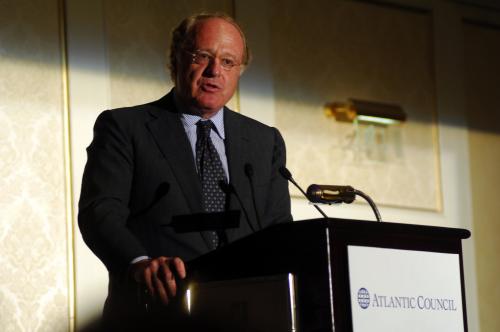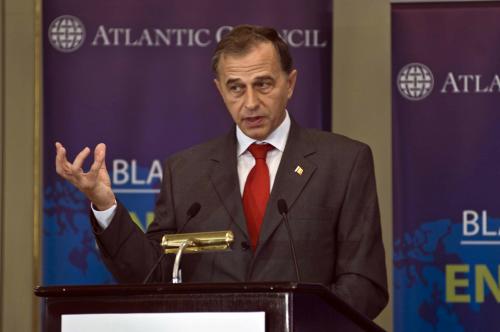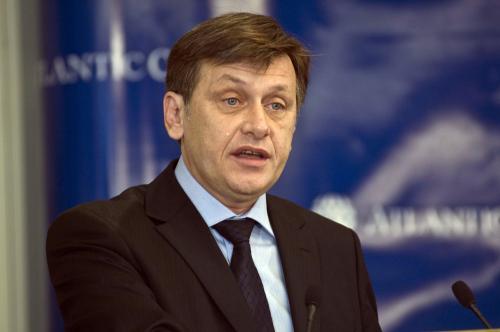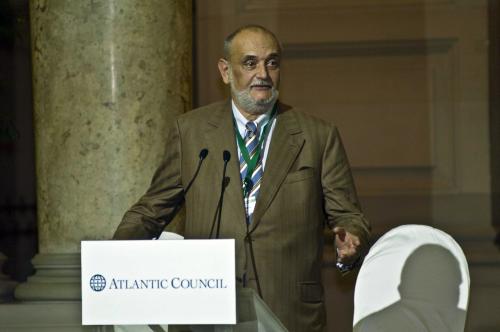Back to Black Sea Energy and Economic Forum
Energy Diversity at the Black Sea Energy and Economic Forum:
Energy diversity in the Atlantic community emerged as the major theme in comments from both Ambassdor Richard Morningstar, U.S. Special Envoy for Eurasian Energy, and Paolo Scaroni, Chief Executive Officer of Eni, on the opening night of the Forum.

Morningstar (above) said that energy security, “a pillar of U.S. foreign policy,” is best ensured by a diversity of supplies, transportation routes and consumers. Regional cooperation in the Black Sea-Caspian region is the key to achieving a Southern Corridor for natural gas, where Nabucco enjoys “bipartisan” support in the U.S.
Greater diversification of energy supplies will also form a long-term bond between the countries of Central Asia and Europe. Addressing Russia, he noted that pursuing a zero-sum game over energy in the Caucasus has become too expensive of an option. However, Morningstar stressed that diversification for political reasons is not the right kind of diversification; projects must also be commercially viable.
 Scaroni (right) stated that delays from the huge amounts of traffic crossing through the Bosphorus are another reason to construct pipelines across the Black Sea, twhich in turn helps diversify energy supplies. Such pipelines, though, will still require Turkey’s help. Turkey is the most important transit country in the region, Scaroni said, and “In energy terms, Turkey has already joined the EU.”
Scaroni (right) stated that delays from the huge amounts of traffic crossing through the Bosphorus are another reason to construct pipelines across the Black Sea, twhich in turn helps diversify energy supplies. Such pipelines, though, will still require Turkey’s help. Turkey is the most important transit country in the region, Scaroni said, and “In energy terms, Turkey has already joined the EU.”
 Introducing President of the Romanian Senate Mircea Geoana (left), Senator Chuck Hagel described the Black Sea-Caspian region as a “crossroads of energy, economics and geopolitical influences.” Geoana then stressed Romania’s commitment to Atlanticism, adding, “NATO’s new strategic concept is reshaping the philosophy of the alliance.” Vice President of the Romanian Senate Crin Antonescu (right) also emphasized Romania’s full integration into the Euro-Atlantic community.
Introducing President of the Romanian Senate Mircea Geoana (left), Senator Chuck Hagel described the Black Sea-Caspian region as a “crossroads of energy, economics and geopolitical influences.” Geoana then stressed Romania’s commitment to Atlanticism, adding, “NATO’s new strategic concept is reshaping the philosophy of the alliance.” Vice President of the Romanian Senate Crin Antonescu (right) also emphasized Romania’s full integration into the Euro-Atlantic community.
 During the Executive Roundtable, DP Holding CEO and Atlantic Council International Advisory Board member Dinu Patriciu (below) argued that the oil industry should transition toward gas hydrates, with research that moves away from the “inertia of conventional methods.” Hydrates do not require pipelines to transport, thereby removing much of the political element that often interferes with energy markets. He closed with optimism that new technologies would transform the Black Sea-Caspian area from an energy transit region to an energy production region.
During the Executive Roundtable, DP Holding CEO and Atlantic Council International Advisory Board member Dinu Patriciu (below) argued that the oil industry should transition toward gas hydrates, with research that moves away from the “inertia of conventional methods.” Hydrates do not require pipelines to transport, thereby removing much of the political element that often interferes with energy markets. He closed with optimism that new technologies would transform the Black Sea-Caspian area from an energy transit region to an energy production region.![]()
 Later, the Scenarios for Future Energy Security session addressed European energy security and diversity. The Ukraine gas crises of the last two years transformed the European debate on energy policy, according to Steven Everts of the EU Council. He stressed that energy diversity means diversifying both sources and routes. Dr. Noe van Hulst of the International Energy Forum similarly cautioned against the concept of energy independence over energy supplies from several sources.
Later, the Scenarios for Future Energy Security session addressed European energy security and diversity. The Ukraine gas crises of the last two years transformed the European debate on energy policy, according to Steven Everts of the EU Council. He stressed that energy diversity means diversifying both sources and routes. Dr. Noe van Hulst of the International Energy Forum similarly cautioned against the concept of energy independence over energy supplies from several sources.
Echoing comments from Morningstar, Fabrizio Barbaso, the Deputy Director General of the European Commission’s DG TREN, expanded on the concept of interdependence during his keynote address, arguing for the liberalization of energy markets in Europe. EU legislation should establish a fully functioning internal market for energy as well as emergency plans to counter energy security concerns such as a cut in supplies or problems arising from climate change. He also called for the creation of a U.S.-EU Energy Council for better transatlantic cooperation on energy issues, which will likely be announced at a U.S.-EU meeting in Washington in November.
